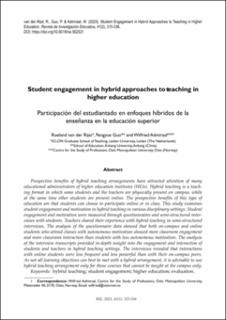| dc.contributor.author | Van der Rijst, Roeland | |
| dc.contributor.author | Guo, Pengyue | |
| dc.contributor.author | Admiraal, Wilfried | |
| dc.date.accessioned | 2023-08-01T09:21:24Z | |
| dc.date.available | 2023-08-01T09:21:24Z | |
| dc.date.created | 2023-07-08T07:37:25Z | |
| dc.date.issued | 2023 | |
| dc.identifier.citation | Revista de Investigación Educativa. 2023, 41 (2), 315-336. | en_US |
| dc.identifier.issn | 0212-4068 | |
| dc.identifier.uri | https://hdl.handle.net/11250/3082081 | |
| dc.description.abstract | Prospective benefits of hybrid teaching arrangements have attracted attention of many educational administrators of higher education institutes (HEIs). Hybrid teaching is a teach-ing format in which some students and the teachers are physically present on campus, while at the same time other students are present online. The prospective benefits of this type of education are that students can choose to participate online or in class. This study examines student engagement and motivation in hybrid teaching in various disciplinary settings. Student engagement and motivation were measured through questionnaires and semi-structured inter-views with students. Teachers shared their experience with hybrid teaching in semi-structured interviews. The analysis of the questionnaire data showed that both on-campus and online students who attend classes with autonomous motivation showed more classroom engagement and more classroom interaction than students with less autonomous motivation. The analysis of the interview transcripts provided in-depth insight into the engagement and interaction of students and teachers in hybrid teaching settings. The interviews revealed that interactions with online students were less frequent and less powerful than with their on-campus peers. As not all learning objectives can best be met with a hybrid arrangement, it is advisable to use hybrid teaching arrangement only for those courses that cannot be taught at the campus only. Keywords: hybrid teaching; student engagement; higher education; evaluation. | en_US |
| dc.language.iso | eng | en_US |
| dc.rights | Attribution-NonCommercial-NoDerivatives 4.0 Internasjonal | * |
| dc.rights.uri | http://creativecommons.org/licenses/by-nc-nd/4.0/deed.no | * |
| dc.title | Student engagement in hybrid approaches to teaching in higher education | en_US |
| dc.title.alternative | Student engagement in hybrid approaches to teaching in higher education | en_US |
| dc.type | Peer reviewed | en_US |
| dc.type | Journal article | en_US |
| dc.description.version | publishedVersion | en_US |
| cristin.ispublished | true | |
| cristin.fulltext | original | |
| cristin.qualitycode | 1 | |
| dc.identifier.doi | https://doi.org/10.6018/rie.562521 | |
| dc.identifier.cristin | 2161508 | |
| dc.source.journal | Revista de Investigación Educativa | en_US |
| dc.source.volume | 41 | en_US |
| dc.source.issue | 2 | en_US |
| dc.source.pagenumber | 315-336 | en_US |

